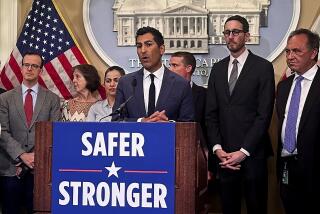Bills to Thwart Piracy Falter
- Share via
In a blow to Hollywood and the major record companies, Congress adjourned for the year Wednesday without beefing up penalties for movie bootlegging and online piracy.
Lawmakers had seemed ready earlier in the year to grant the entertainment industry several items on its wish list, including measures that would make it easier to prosecute people who record films in theaters or share songs or movies online before their official release.
Although the House and the Senate gave preliminary approval to a number of the proposals, they enacted nothing into law -- in part because of internecine squabbles among Republican lawmakers, in part because of increasingly intense lobbying by opponents.
And as is customary in Washington, both sides claimed victory.
Recording Industry Assn. of America Chief Executive Mitch Bainwol said the industry’s lobbying raised awareness of the “enormous theft out there that is compromising the vitality of important American industries.” He added that “there is a consensus that there is a problem. We broke down on how you define an answer.”
Gigi B. Sohn of Public Knowledge, a Washington-based advocacy group that opposes efforts to expand the reach of copyright law, countered that the studios and labels “basically did not get any of the legislative things they really wanted.... They’re batting zero.”
The focus in Washington now shifts to the Supreme Court, which could announce as early as this week whether it will take up a case crucial to the entertainment industry. At issue is the 9th Circuit Court of Appeals’ decision this year that the companies producing Morpheus and Grokster file-sharing software weren’t liable for the rampant bootlegging of music and movies on those networks.
Even if the Supreme Court agrees to hear the entertainment industry’s appeal, the industry is likely to renew the push for new anti-piracy laws early next year. And its allies like their chances, given the groundwork laid this year.
“We do think we have a pretty broad consensus” in favor of measures such as the ones to ban the use of camcorders in theaters and increase prosecution of online pirates, said Rep. Howard L. Berman (D-North Hollywood). “We’re going to move this early next year.”
Meanwhile, a cadre of technology companies, Internet service providers, consumer-electronics manufacturers and related trade groups is ready to fight again if bills are written to be as far-reaching as the ones that died this year.
“Anything large and sweeping in the copyright area is just not going to pass,” Sohn said. “There’s too large of a coalition of industry and nonprofits that will oppose this.”
Congress did give the entertainment industry one piece of its anti-piracy agenda: It funded three new high-level posts in the White House, the U.S. Trade Representative’s office and the State Department to coordinate federal efforts to enforce copyright law and combat piracy overseas.
“What the federal government is saying,” Bainwol said, “is that intellectual property is an important national priority, and we’re going to step up our enforcement, and we’re going to step up our coordination.”
The industry’s lobbyists also helped bottle up HR 107, which would have expanded consumers’ ability to circumvent the electronic locks on DVDs and other media.
“Probably our most important accomplishment this year was defeating HR 107,” said Fritz Attaway, the top lobbyist for the Motion Picture Assn. of America.
At least part of the problem for the entertainment industry’s anti-piracy bills was a tussle between two powerful Republicans over an unrelated issue: boxing.
In the lame duck session just before Thanksgiving, the Senate passed a bill that incorporated several anti-piracy provisions already approved in some form by the House; these included outlawing the use of camcorders in theaters and the posting of copyrighted works on public computer networks before their release.
Most of the bill, however, was devoted to an effort by Senate Commerce Committee Chairman John McCain (R-Ariz.) to regulate boxing. The bill died when House Energy and Commerce Committee Chairman Joe Barton (R-Texas) objected to the boxing provisions, lobbyists and congressional staff members said.
The McCain-Barton tiff was just the last in a series of problems that derailed the entertainment industry’s agenda.
Opposition within the Senate blocked House-passed bills that would have made it easier to prosecute people who made copyrighted works available on file-sharing networks and would have authorized the Justice Department to sue people over copyright law violations.
And a controversial proposal that would have made it illegal to induce someone to infringe copyrights -- a bill aimed squarely at the companies behind Kazaa, Grokster and other file-sharing networks -- never made it out of the Senate Judiciary Committee.
More to Read
The biggest entertainment stories
Get our big stories about Hollywood, film, television, music, arts, culture and more right in your inbox as soon as they publish.
You may occasionally receive promotional content from the Los Angeles Times.











